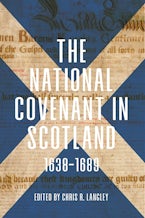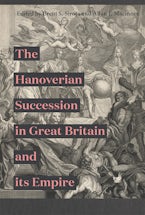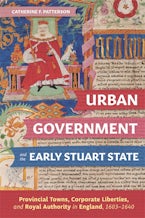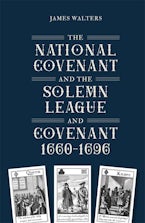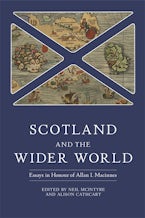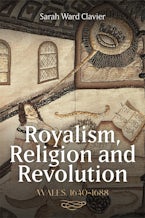
Title Details
330 Pages
23.4 x 15.6 cm
3 b/w, 1 line illus.
Series: Studies in Early Modern Cultural, Political and Social History
Series Vol. Number:
45
Imprint: Boydell Press
Urban Government and the Early Stuart State
Provincial Towns, Corporate Liberties, and Royal Authority in England, 1603-1640
- Description
- Contents
- Author
- Reviews
Examines relations between centre and localities in seventeenth century England by looking at early Stuart government through the lens of provincial towns.
This book investigates relations between centre and localities in seventeenth century England by looking at early Stuart government through the lens of provincial towns. Focusing particularly on incorporated boroughs, it emphasises the distinctive circumstances that shaped governance in provincial towns and the ways towns contributed to the state. Royal charters of incorporation legally defined patterns of self-government and local liberties in corporate boroughs, but they also created a powerful bond to the crown. The book argues that a dynamic tension between local autonomy and connection to the centre drove relations between towns and the crown in this period, as borough governments actively sought strong ties with central authority while also attempting to preserve their chartered liberties. It also argues that the 1620s and 1630s ushered in new patterns in the crown's relations with incorporated boroughs, as Charles I's regime hardened policies towards urban localities. Based on extensive original research in both central government records and the archives of a wide range of provincial towns, the book covers critical aspects of interaction between towns and the crown, including incorporation and charters, governance and political order, social regulation, trade, financial and military exactions, and religion.
This book investigates relations between centre and localities in seventeenth century England by looking at early Stuart government through the lens of provincial towns. Focusing particularly on incorporated boroughs, it emphasises the distinctive circumstances that shaped governance in provincial towns and the ways towns contributed to the state. Royal charters of incorporation legally defined patterns of self-government and local liberties in corporate boroughs, but they also created a powerful bond to the crown. The book argues that a dynamic tension between local autonomy and connection to the centre drove relations between towns and the crown in this period, as borough governments actively sought strong ties with central authority while also attempting to preserve their chartered liberties. It also argues that the 1620s and 1630s ushered in new patterns in the crown's relations with incorporated boroughs, as Charles I's regime hardened policies towards urban localities. Based on extensive original research in both central government records and the archives of a wide range of provincial towns, the book covers critical aspects of interaction between towns and the crown, including incorporation and charters, governance and political order, social regulation, trade, financial and military exactions, and religion.
List of Figures
Acknowledgments
Editorial Conventions and Abbreviations
Location Map
Introduction
PART 1. GOVERNING CORPORATE TOWNS
1 Shaping the Body Politic: Charters of Incorporation and Early Stuart Government
2 Challenging Charters: Borough Corporations and Quo Warranto
3 Managing Division: Borough Government, Central Authority, and Municipal Elections
PART 2. CORPORATE TOWNS AND THE BUSINESS OF GOVERNMENT
4 Governing Poverty and Disorder: Corporate Towns and Social Policy
5 Promoting Peace and Plenty: Corporate Towns and Trade
6 Paying the Price: Corporate Towns and the Burdens of the State
7 Defining Church and Corporation: Corporate Towns and Religious Policy
Conclusion
Bibliography
Index
Acknowledgments
Editorial Conventions and Abbreviations
Location Map
Introduction
PART 1. GOVERNING CORPORATE TOWNS
1 Shaping the Body Politic: Charters of Incorporation and Early Stuart Government
2 Challenging Charters: Borough Corporations and Quo Warranto
3 Managing Division: Borough Government, Central Authority, and Municipal Elections
PART 2. CORPORATE TOWNS AND THE BUSINESS OF GOVERNMENT
4 Governing Poverty and Disorder: Corporate Towns and Social Policy
5 Promoting Peace and Plenty: Corporate Towns and Trade
6 Paying the Price: Corporate Towns and the Burdens of the State
7 Defining Church and Corporation: Corporate Towns and Religious Policy
Conclusion
Bibliography
Index
"This is a valuable contribution to the historiography of the early Stuart state and its relationship to society." Jonathan Barry, H-Net
Hardcover
9781783276875
April 2022
£85.00 / $125.00
Ebook (EPDF)
9781800104969
April 2022
£24.99 / $29.95
Ebook (EPUB)
9781800104976
April 2022
£24.99 / $29.95
Title Details
330 Pages
2.34 x 1.56 cm
3 b/w, 1 line illus.
Series: Studies in Early Modern Cultural, Political and Social History
Series Vol. Number:
45
Imprint: Boydell Press



